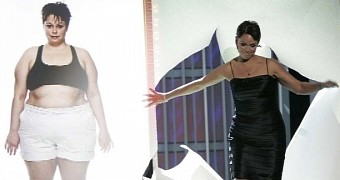NBC’s The Biggest Loser has been on the air for years and is about to start its 16th season soon. In an industry where most reality shows barely make it for a couple of seasons, this kind of popularity, which in this particular case has been on the rise in recent editions, means one thing: this show is here to stay.
Also in recent years, speculation has been mounting as regards the safety of the weight loss methods used by the trainers and enforced by producers. Former “loser” Kai Hibbard, who was a contestant in 2006, says that it’s these practices that will eventually lead to disaster because they are dangerous, abusive, absolutely cruel.
“A fat-shaming disaster”
Hibbard was on the show in 2006, when it was still relatively new and she’d even heard of it. She was 26 and had gained so much weight that she tipped the scales at 265 pounds (120 kg), which was a lot on her small frame.
She tells the New York Post that one of her best friends staged an intervention to make her understand she had a serious weight problem, convincing her to send in an audition tape to be on the show. She thought she was the luckiest girl in the country when she got a call back and was told she’d been selected.
Hibbard lost 121 pounds (54.8 kg) while on the show, some of which she gained back once she was done. She won’t say how much of that weight came creeping back, but she is very bent on stressing that the way “losers” are treated during the production is emotionally abusive and physically dangerous.
This starts with the moment they’re picked from the airport, checked into a hotel and locked in their room for 5 straight days, after having their phones and laptops confiscated. Things get really bad at the Biggest Loser ranch, where they’re forced to train from 5 to 9 hours a day, and put on a diet of less than 1,000 calories.
Medical advice offered by the doctors on staff is always ignored by the trainers, she says, because it usually means taking supplements that add to the calorie count or sitting workouts out.
Every day, contestants are told they’re fat and useless, that they will die before they will get to see their children grow up, that they’re pathetic and ugly, that they deserve to be in pain. At the same time, the idea that they’re lucky to be there is hammered into them, to force them to want to please the producers by doing everything they’re told, no matter how painful or risky.
“The whole [expletive]-ing show,” she says, “is a fat-shaming disaster that I’m embarrassed to have participated in.”
Irreparable damage
It isn’t just the contestants’ ego and sense of worth that take a bruising, Hibbard continues. Putting a clearly overweight person through this kind of workout routine, of so many hours of intense exercise, for every single day, means countless injuries and damage to the joints that will never be fixed.
She says she left the show with severe splits in her shins, of which she found nothing until she got a checkup after she returned home. “My hair was falling out. My period stopped. I was only sleeping three hours a night,” she recalls. She didn’t recover from that either.
As for why she’s speaking out now, it’s probably because she’s really upset at seeing the show is still on air. Perhaps she mustered more courage after hearing trainer Jillian Michaels also left because she thought producers were putting the TV experience above contestants’ health and safety.
Hibbard insists she’s doing it because she feels responsible. “If I’m going to walk around collecting accolades, I also have a responsibility [to tell the truth],” she says. “There’s a moral and ethical question here when you take people who are morbidly obese and work them out to the point where they vomit, all because it makes for good TV.”

 14 DAY TRIAL //
14 DAY TRIAL //